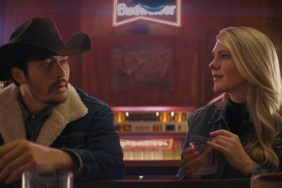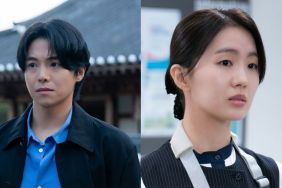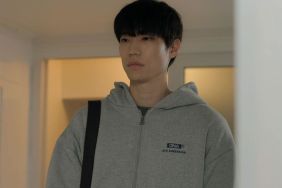It’s been many years since Julien Temple’s name was almost synonymous with MTV but years before he became a world commercial music video director and as director of the cult musical Earth Girls are Easy, Temple had his camera trained on the developing British punk scene during the late ’70s, having been one of the first filmmakers to capture The Clash and The Sex Pistols on film. With that in mind, it made sense that he would later become a punk documentarian, first in 1979 with The Great Rock and Roll Swindle and then twenty years later with The Filth and the Fury, both featuring the Sex Pistols.
Temple’s latest documentary Joe Strummer: The Future is Unwritten is a far more personal affair that looks at the life and music of his good friend Joe Strummer, who died suddenly and tragically in 2002. Featuring tributes from an amazing array of Strummer’s friends, musical collaborators and those inspired by his music, “The Future is Unwritten” is a movie that all Clash fans will love, but it also acts as a great primer for anyone who’s wanted to learn why the band and Strummer himself had created such a devout fanbase over the years. More importantly, it allowed Temple to pay tribute to his friend in a way that will allow him to be remembered for ages as one of the most eclectic music-makers of the last century.
In this entertaining interview with Temple, ComingSoon.net learned about the origins of this project as well as a few tidbits about his intriguing next musical film project. As one might expect, Temple has a very wry sense of humor, and it was fun to get the opportunity to briefly discuss the virtues and travails of today’s music biz with someone who’s seen it from both sides as the punk movement led into the days of MTV homogenization.
ComingSoon.net: Did you know Joe or anyone else in the Clash before you started filming them?
Julien Temple: No, I knew of Joe before I filmed what I did film of the Clash in ’76 and ’77. I knew of him as The 101ers’ singer in the squat while I lived in the second big squat that he hadnot the one on Walterton Road where he formed The 101ers but they moved to a place called Orsett Terrace–and that was right around the corner from where I was involved in a squat. I was aware of him and I saw them play at one time, and I also saw him on the streets in the area, so I knew the guy, but I didn’t know him personally.
CS: Was he already going by the name Joe Strummer at that time?
Temple: Yeah, yeah, he was. Halfway through the 101ers, he changed from “Woody” to Joe Strummer.
CS: There was so much amazing stuff in this movie from before Joe joined The Clash and you’ve known him for a long time, but where did you get all that information?
Temple: Well, it was a mixture of talking to him, but also collecting interviews from lots of sources. The best ones were often (the ones where) people would say, “It’s great, Julian, but you can’t use it ’cause the sound quality’s so bad” because it was recorded in a bar in Madrid at 3 in the morning and there’s glasses falling on the floor and the quality of an audio cassette. I was kind of trying really hard to use it because it was the real Joe that you got then, rather than sitting in a studio with a big spotlight on him. It’s a very different feel you have and the conversation’s just freer and truer. Lucky I had some great sound people who wouldn’t give up cleaning the sound, so at least you can hear it, which is all you need to do really.
CS: When you get to the Clash stuff, there’s a lot of footage you shot and from TV, but for the earlier stuff, you went with more abstract thinking, showing images that influenced him. I was curious why you decided to do that?
Temple: Well, you had to do that because there was less material obviously when he was a child, although quite a few photographs and things and little bits of Super 8 film. I was born in the same year as Joe, so I had a sense of a brief ’50s childhood and coming of age in the mid-’60s as a schoolkid. I chose things that I knew were kind of resonant with growing up at that time from my point of view as well as following his story and where he was. Things like that Turkish Delight ad when he goes to Turkey, that’s an ad for a sweet candy that every English kid would fantasize about having at the time. And they had these bizarre ads with sultans and belly dancers selling the stuff. I like the idea of using almost fiction to create the story of a real story, so you’re kind of blurring the boundaries a bit, and though you’re making a documentary, you’re trying to create it as a very tight narrative so that people can emotionally be taken on a ride like it is a narrative drama film. It seems to me like using elements of other movies as well as documentary footage to tell that story where it works is an interesting way of breaking down what a documentary is.
CS: Had you made any plans to make a movie while Joe was still alive or was this something that came about after his death?
Temple: No, there’s a real sadness about this movie existing really, because it really wouldn’t be here if he was here. I wouldn’t have come near it, no.

CS: When did you decide to make this movie and start doing the research and start looking for footage?
Temple: It was not immediately after he died. It was probably three years after he died, and like other people who knew him pretty well towards the end, I was still shaken up by what had happened. A bit disoriented, a bit like something was missing in my life, and a feeling also that we hadn’t done a memorial for Joe, had a concert or whatever, and a lot of his friends were feeling still very close to the pain of losing him. I was editing another film called “Glastonbury” and there was a sequence in it that Joe was featured in, and I just thought, “Here’s this great guy and this great little sequence and maybe I can get everyone back around a campfire and we can say what was special about Joe and kind of hand it on.” Also, maybe help ourselves, maybe in a personal way I was feeling for other people that maybe it would help that it would maybe help everybody feel a bit better having lost him.
CS: How hard was it getting all those people around the campfire? I assume you must have done a few different set-ups.
Temple: Yeah, we did two in New York City and two in L.A. and two in London, one in Granada and we did two down in Somerset where Joe lived. People wanted to be a part of it though, who knew him and who’d been inspired him. They heard we were doing the show sometimes and wanted to be a part of it. It wasn’t like, “Let’s go desperately chasing too many.” ‘Cause it was Joe, they very much wanted to be involved, and when I see the end credits, there’s an incredible amount of music in licensing, which you normally would… actually, the only guy we couldn’t use that we wanted, because it would have worked in one point of the story was Hendrix, and they wanted $186,000 for a clip whereas everyone else gave it for virtually nothing, because it was Joe, and because The Clash said they would do it for a price that would make the movie possible. Everyone else came in and said, “It’s for Joe Strummer and the Clash, we’ll do it.”
CS: How hard was it getting Mick Jones involved? I noticed that he was interviewed on his own and without anyone else.
Temple: Well, I think Mick has a real sense of humor, so he said, “I’ll do it, but I want to be in front of a three-bar electric fire rather than a campfire.” That’s his prerogative. That’s the kind of fire he used to grow up with in his Nan’s flat.
CS: The campfire idea is interesting, although I wasn’t exactly sure what was going on or why everyone was sitting at a campfire until an hour in when it’s explained. Did you ever play around with the structure to try to introduce that idea earlier?
Temple: I played around with it quite a lot, but then thought, “Why not go chronologically? It’s this guy’s life.” What’s the point of having tricking… “let’s have the middle third at the end” or whatever. It didn’t seem logical to do that. I liked the idea that people would be sitting there saying, “What the hell is up with that?” That’s good, I like that.
CS: You made a movie about the Sex Pistols five or six years ago, so did make that help make this one easier, barring the emotional aspect of this film?
Temple: Well, I think this is a slightly different feel to the Pistols one. This is more personal and more emotionally involving I think, and maybe less fireworks in the sense of the Pistols one was really pulling random things out of a hat and making them work together. There is a bit of that in this, but it’s slightly different. It was certainly harder to make a film in a sense about a close friend, because you’re worried about how you’re portraying him and second-guessing what he’d think. I mean, I did kind of know I was on safe ground showing some of the flaws and warts and contradictions of the guy, because he would have strangled me if I didn’t do that.
CS: Had you been able to spend a lot of time with Joe in his later years when he was doing the Mescaleros?
Temple: Yeah, I did, well the last seven or eight years, I was pretty close to him. I saw the Mescaleros develop, saw the first show they did, and saw the kind of upward path that made it harder to take when he died, because he was just connecting with something he really believed in and it had taken off a bit, and he was getting it more where he wanted it to go.

CS: Did you work with Joe’s family in terms of showing it to them early and get any kind of feedback from them?
Temple: Of course. You want to show respect to his family and they should be the first one to show it to, and if they had really strong objections to things, I would act on that. I wouldn’t have them tell me how to do it, but I would want to take into consideration their views on it.
CS: There was another documentary that I think you used some footage from, which followed Joe’s last tour with the Mescaleros.
Temple: Yeah, we had a clip from that. “Let’s Rock Again” it was called.
CS: That movie made it seem like it was really hard for him in the later years to get people to shows and trying to find a new audience.
Temple: Yeah, because people are pretty narrow-minded. They want the Clash. “Let’s reform the Clash
and then you can be Joe Strummer again.” If you go out and do something else, you have to pay your dues all over again, and I think Joe would like that idea actually, rather than come parachuting in to Madison Square Garden. He’d like to start on the pavement and try and hustle some radio play and all that kind of thing.
CS: Joe and Mick had been apart for many years but then Mick joined Joe for one of the last Mescaleros shows. Was there some sort of reconciliation going on at that time before Joe passed or had they been friendly but just not in a public way?
Temple: You know, there was certainly a period of time where they weren’t friendly, but it didn’t last that long. I think you have the perception that they were more estranged for longer than they were. I mean, Joe produced the Big Audio Dynamite album for example, here in the city actually, and there kids had grown-up together. Yeah, they were friends, but they hadn’t played together on-stage until ironically ten days before Joe died.
CS: Did anyone capture that show on film?
Temple: Just kids in the crowd.
CS: Another question I had about footage was one bit that I loved which showed the Clash in their early days rehearsing an early version of “London’s Burning.” Did you shoot that?
Temple: Yeah, yeah.
CS: Is there a chance we might see more of that raw footage on the DVD for the movie?
Temple: Do you think it’s a good idea? Well, there’s more where that came from, yeah. It could be good.
CS: You must have a lot of stuff like that which people would probably love to see. How many hours of footage did you shoot yourself over the years?
Temple: Well, I only shot them at that time, early ’76 and ’77, but I’ve got about 14 hours of stuff I think somewhere, so that would be like 5 DVD’s. I wouldn’t do that. A lot of it is rubbish. (laughs)
CS: Have you had any thoughts about doing another dramatic feature or another documentary?
Temple: Well, I’m editing an opera film that I shot in the summer, and I have plans for some narrative fiction features. At some point, I want to do a film about the Kinks, but I think I will have some fictional aspects to it as well as archive, because I like to move it beyond what I’ve just done here, and try and find a way to create some narrative situations as well as using some great archive and other things.
CS: Which opera is it?
Temple: It’s a new opera, an Australian operaeven stranger and stranger. It’s an interesting story based on a guy’s life, but it’s a good story. It’s called “The Eternity Man” and he (Arthur Stace) wrote the word on the streets in chalk in Sydney for 40 years every night, and he was writing this word, so he became Australia’s most prolific writer, although he wrote one word again and again, and you know, it’s this great thing to write “eternity” and the next time it rains, it’s washed away. It has been staged in a minimal way, but we shot it as a narrative in the streets with singers and actors. It should come out in some form next year. It would be nice to get it into a festival. It’s something different, so we’ll see what you think.
CS: Sounds interesting and it’ll be nice to see your return to the form as an alternative to the current musical trends of movies like “Rent” and “High School Musical.”
Temple: Yeah, yeah, well you gotta try and keep it fresh.

CS: Are you still directing music videos at all or are you not as interested in doing that anymore?
Temple: Not that keen to do it day-in day-out, no, but the odd one. I did one for the Baby Shambles, I did two for them actually last year. I don’t know. I don’t mind doing them if I’m kind of turned on by the idea and feel they’ve got something to say, and I can say something. The thing is that there’s no money now, so you don’t do it for the money, like at some point in the past, I do have to confess to do some for the money. But no, you can’t live off it, so you just do it because you’re attracted to the music and it’s fun to work with these guys. I have done that, on and off, but not day-in day-out.
CS: It’s already starting to die out a bit but what did you think of the punk resurgence that was happening in California a few years ago as someone who was at the forefront of the original movement?
Temple: Well, I’m not that interested in punk music revivals. I think old punks are just as bad as old hippies ever were, and you know, you should do things in the spirit of something but not in the letter of it, like copying an old punk style basically or (wearing a) Mohican. It’s a bit boring because it’s been done, you know where it’s coming from, you can see it coming a mile away. You want something that jumps out of a tree in the dark.
CS: I’m not sure we’ll be seeing that any time soon, because the bands that seem to be successful are the ones that are doing things that are familiar or have been done before.
Temple: Yeah, but times changed, don’t they? I don’t think thinking is necessarily destined to die out. I know we’re trying hard to keep people from thinking, and people seem to be buying that it’s a good idea, but in the end, if you want to be human, we have to think, and I think people are going to wake up to that, hopefully before it’s too late.
CS: You’ve obviously seen so much of the music industry in the last 30 years, so have you ever considered writing an auto-biography? You must have so many great stories.
Temple: I do have stories, and I have been vaguely approached to do that, but there is that feeling if you do that, you feel that you’re over. I’d rather get a few more goods stories to tell before I spill ’em all out.
CS: Have you been writing them down or keeping track of them for later reference?
Temple: I haven’t written them down. I’d like to do it before I get Alzheimer’s or whatever. (laughs)
Joe Strummer: The Future is Unwritten will open on Friday, November 2, in New York at the IFC Center and in L.A. at the Landmark Nuart Theatre, with an expansion into other cities on November 9.









